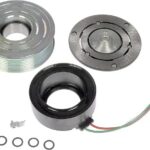Regular car diagnostic tests are essential for proactive vehicle maintenance, helping to identify potential issues before they turn into costly repairs. These tests are designed to thoroughly examine your vehicle’s critical systems, including the engine, transmission, exhaust, and brakes. By precisely pinpointing mechanical, electrical, and software problems, a full diagnostic ensures your car operates at its best and maintains a high level of safety.
Garages and auto-repair shops offer comprehensive car diagnostic services to help keep your vehicle in top condition.
Understanding a Full Car Diagnostic Test
A full car diagnostic test goes beyond a basic check-up. It utilizes specialized software and equipment to delve deep into your vehicle’s computer system, sensors, and microchips. This advanced analysis can detect subtle or developing faults that might not be immediately apparent through visual inspection or basic performance checks. It’s like giving your car a comprehensive health check to catch any underlying issues.
Alt text: Automotive technician performing a full diagnostic test on a car using diagnostic equipment, checking for engine and system faults.
The Importance of a Full Diagnostic on Your Car
Why is investing in a full diagnostic test a smart move for car owners? Here are several key benefits:
Early Problem Detection and Prevention
A full diagnostic is invaluable for catching problems in their early stages. By identifying minor issues before they escalate, you can prevent major breakdowns and expensive repairs down the line. This proactive approach can save you significant money and inconvenience in the long run, avoiding situations where you might be stranded due to a preventable car failure.
Boosting Fuel Efficiency
Engine performance is directly linked to fuel consumption. A full diagnostic can pinpoint issues such as malfunctioning oxygen sensors or clogged fuel injectors that reduce fuel efficiency. Addressing these problems can optimize your car’s engine performance, leading to noticeable savings at the fuel pump and reducing your environmental footprint.
Enhancing Vehicle Performance and Safety
A car operating at its peak performance is not only more enjoyable to drive but also safer. Full diagnostic tests can identify and resolve issues affecting engine power, braking systems, and steering responsiveness. By ensuring all systems are functioning correctly, you enhance your car’s overall performance, handling, and safety for you and your passengers.
Ensuring Emission Standards Compliance
Environmental regulations are increasingly stringent, and vehicles must meet specific emission standards. A full diagnostic test helps ensure your car is running cleanly and efficiently, verifying that it complies with these regulations. This is especially important in areas with mandatory emission testing, helping you avoid fines and contribute to cleaner air quality.
What a Full Diagnostic Test Examines
A full diagnostic test is thorough, examining a wide range of your vehicle’s systems. Typically, it will assess:
- Engine Management System: Including sensors, fuel injection, ignition, and air intake.
- Transmission System: Checking for electronic faults and performance issues.
- Braking System (ABS): Evaluating the anti-lock braking system and related components.
- Exhaust System: Analyzing catalytic converter efficiency and oxygen sensor performance.
- Emissions Control System: Ensuring compliance with environmental standards.
- Airbag System (SRS): Checking for faults in the supplemental restraint system.
- Climate Control System: Diagnosing issues with air conditioning and heating.
- Body Control Systems: Examining electronic components related to lighting, windows, and locking.
- Dashboard Warning Lights: Investigating the cause of any illuminated warning lights.
It’s important to understand that a diagnostic test itself doesn’t include the cost of repairs or replacement parts. The test is designed to identify problems and provide fault codes. Your mechanic will then use these codes to recommend necessary repairs. If your chosen garage doesn’t offer the specific repair services needed, they will provide you with the diagnostic fault codes, allowing you to seek quotes from specialized repair shops.
A comprehensive full diagnostic test can take anywhere from one to two hours, depending on the complexity of the vehicle and any issues uncovered. If the diagnostic reveals complicated problems or requires the removal of components for testing, the process may take longer. Remember, this timeframe only covers the diagnostic process, not the time needed to carry out any subsequent repairs.
Alt text: Experienced mechanic connecting a professional diagnostic scan tool to a car engine’s computer port to analyze potential problems.
Cost Considerations for a Full Car Diagnostic
The price of a full car diagnostic test can vary based on several factors, including your location within the UK, the type of repair facility (independent garage vs. dealership), and the make and model of your vehicle. Vehicles requiring more specialized diagnostic equipment, such as luxury cars or high-performance sports models, may incur higher testing costs due to the increased complexity and time involved.
Generally, you can expect to pay between £50 and £150 for a full diagnostic test. While this is an additional cost to regular car maintenance, consider it an investment in preventing larger, more expensive problems in the future.
Regular diagnostic testing is a cost-effective approach to car maintenance. By detecting and addressing minor issues early, you avoid the risk of them developing into major failures that could cost hundreds or even thousands of pounds to repair.
Recommended Frequency of Full Diagnostic Tests
While there isn’t a strict rule for how often to get a full diagnostic test, incorporating it into your routine car maintenance schedule is highly advisable. A common recommendation is to have a diagnostic test performed annually as part of your car’s yearly service. Additionally, it’s wise to schedule a diagnostic test whenever you notice any changes in your car’s performance, such as unusual noises, decreased fuel efficiency, or illuminated warning lights on the dashboard.
Understanding Diagnostic Trouble Codes (DTCs)
Modern vehicles utilize standardized Diagnostic Trouble Codes (DTCs), primarily OBD-II codes. These codes are triggered when the car’s computer detects a fault or system malfunction. The specific code is stored in the vehicle’s memory and retrieved during a diagnostic test using specialized software.
Over 2000 potential fault codes exist, categorized into four main areas, each identified by a prefix letter:
- P-Codes (Powertrain): Relate to the engine, transmission, and drivetrain components. These are the most common codes.
- C-Codes (Chassis): Involve mechanical systems like the suspension, braking, and steering.
- B-Codes (Body): Concern components within the passenger compartment, such as airbags, air conditioning, and electric windows.
- U-Codes (Network/Communication): Indicate issues with the vehicle’s communication network, wiring, and computer systems.
Debunking Common Myths About Diagnostic Tests
It’s important to clear up some common misconceptions surrounding car diagnostic tests:
- Myth: “A diagnostic test fixes the car.” Fact: A diagnostic test only identifies problems. Repairs are a separate process requiring additional time and cost.
- Myth: “Only professional mechanics can do diagnostics.” Fact: While comprehensive diagnostics require professional equipment, basic OBD-II scanners are available for car owners to read basic fault codes themselves. However, interpreting complex codes and performing thorough diagnostics is best left to professionals.
- Myth: “Diagnostic tests are only for when the ‘check engine light’ is on.” Fact: Diagnostic tests are valuable for assessing a wide range of systems, including airbags, ABS, transmission, and more, even if the check engine light isn’t illuminated. Regular testing can uncover hidden issues before they trigger warning lights.
For a comprehensive understanding of your vehicle’s health and to ensure optimal performance and safety, a full diagnostic test is an invaluable service. Consider scheduling a test as part of your regular car maintenance routine.


